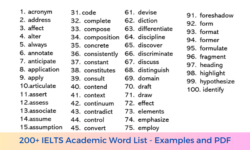5 English Writing Tools And Tips To Improve Your Writing Skills
English writing is an essential skill to learn. But, can you use tools to improve this skill?
English is the most spoken language in the world, with 1.5 billion speakers. Being the dominant language on the global scale, written content in English is just as important. However, many people, including students and professionals, seek ways to improve their writing skills.
Therefore, today we’ll explore a few ways to improve their writing skills using English tools. On top of that, we’ll have some valuable tips as well. So, let’s begin.
Why Is It Important To Improve Writing Skills?
Writing skills are essential because they can help you advance in your career or improve your academic grades. They also help you become a better writer. The importance of writing skills is not just limited to the professional world; it is also vital for personal development.
Some people think that writing skills are not necessary for their careers. On the other hand, some believe it does not matter how good of a writer you are, but this is not true. Writing skills can help you in any field and make you more successful. Here are three examples:
-As a student, it is essential to have good grades because they can determine your future
-In the workplace, having good writing skills will give you an edge over others
-The ability to write well can help you get better jobs and promotions
It is never too late to improve your writing skills, and nowadays, there are many tools that could help you do that. Some of which we’ll be exploring throughout this article. However, more than knowing the tools, it’s important to understand how to use the tools to elevate your writing prowess.
What are Writing Tools? 3 Most-Used Types
Writing tools are used to generate content for a specific purpose. It can be SEO content, academic content, or any other type of content that is needed. Good content is essential for SEO and academia.
It helps with online visibility and helps to get the message across in a way that is easy to understand. Writing tools provide this good content at scale, saving time and resources. Here are three main types of such tools/programs:
Grammar Checker
A grammar checker is a computer program that detects errors in written text. The software analyzes a sentence and checks for grammatical errors, such as subject-verb agreement, misplaced modifiers, and word usage.
It also checks for spelling mistakes and incorrect punctuation. There are many kinds of grammar checkers available to the user: online programs, desktop programs, browser extensions, and mobile apps.
Paraphrasing Tool
Paraphrasing tools are AI-enthused programs that help users to paraphrase texts. It enters the text and replaces the original text with a rewritten version. The rewritten version is based on the user’s preferences and the context of the text.
Plagiarism Finder
A plagiarism checker is a tool that helps you find plagiarized content on the internet. Most of the time, it is used by students to check whether their essays or term papers are plagiarized.
However, it can also be used by businesses and professionals to make sure their content is original and not copied from anywhere else.
English Writing Tools to Improve Your Writing Skills
English writing skills are a sum of a few significant characteristics. This includes grammatical abilities and knowing how to spell and punctuate. On the other hand, formulating original content and ensuring plagiarism-free nature.
However, an apt writer can write those without struggle, as their skills are elevated to such levels. It allows them to write readable and original content. So, to improve such skills, we’ve picked five of the best English writing tools available today. Here they are:
1. Grammar Checker By Paraphraser
Paraphraser.io is known for its paraphrasing tool, but its grammar checker is perhaps their second finest offering. This outstanding grammar corrector can help you understand how to ensure proper grammar in your content. So, how exactly does it help improve writing skills?

Here you can see sample text loaded into the grammar checker. This tool shows you just where your content is spelled wrong. While you can fix them all at once, checking individual spelling also allows you to understand spelling better—especially if you’re an ESL writer.
2. Plagiarism Checker by Prepostseo
PrePostSEO’s plagiarism checker is one of the most renowned tools in the writing community. It has become a favorite for students and professionals, as it helps them find plagiarism. The tool is exceedingly easy to use as well:

Once the content is loaded, you must do a captcha check and let it scan your text.

Here you can see the percentage of plagiarism and the source of the original text. Now, how exactly does it help improve writing skills?
It tells you how much % of your content is plagiarized
It helps find the original source
Making it easier to remove plagiarized content and cite the original source
These factors make it a vital addition to a writer’s arsenal.
3. Rephrase
Info’s paraphraser is one of the best in the business today. This outstanding tool can catapult your writing skills if you know how to use it well. It offers a 500-word limit and three primary content tones. How do they improve your writing skills? Here’s how:

A. These options allow you to pick the content tone you wish to rephrase your content tone into
B. Captcha check
C. Paraphrase your text
How exactly does it impact your writing skills? Here’s the paraphrased text:

The text you see in red is the one rephrased by the tool. It allows you to understand the specifics of each content tone type.
On top of that, you can see the options in blue on the left-side panel: check plagiarism, check grammar, or summarize it. All these options give you a good idea of pertaining writing skills.
4. Hemmingway Editor
Hemmingway Editor is named after one of the most prolific writers. Therefore, the tool allows you to elevate your content in such a way. But what’s its role in improving your writing skills? Let us see what it is first:

Here you can see the basic/sample text loaded into the Hemmingway App. Now, here’s how it can improve your writing skills:
-Improving readability by giving you a grade
-Allowing you to formulate a better sentence
-Helping you understand passive and active voice
-Helping you remove hard-to-read sentences
This tool can be your 4th option in your arsenal to improve your writing skills, as it will elevate your text’s readability.
5. Google Docs
Google Docs is something that’ll make you a lot more apt and collaborative. This tool is a matter of choice since you might be using MS Word. However, using Google Docs has its own perks.

What exactly are those perks?
-It allows you to collaborate
-It has an in-built grammar corrector
-In-built OCR tool
-Best online rich text editor
-Absolutely free
These factors make it another must-have in your arsenal. Therefore, these five tools can significantly advance your writing skills.
Writing Tips To Improve Your Writing Skills
Now that we know the tools, here are a few short tips that you need to treat as rules:
- Always research a lot before you start writing. The more you know about something, the easier it will be to write about it
- Always aim for originality because plagiarism has no space in any writing environment
- Learn various content tones, as it’ll make you a better writer and more adaptive to different writing styles and requirements
- Write short sentences & paragraphs to improve the readability of your text, making it ideal for a wider audience
- Simple language goes a long way, so avoid jargon or overly complicated lingo
- Improve your vocabulary to use words that are easier and more descriptive
These six tips will make you a better writer, and guess what? All the tools we mentioned before can help you with each one of these.





